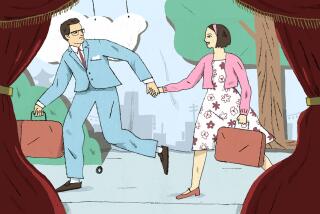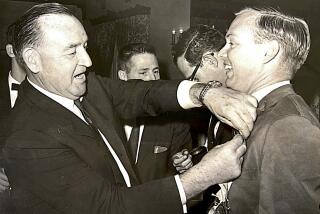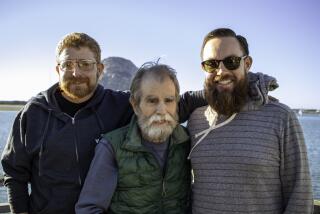Jim Newton: Lunches with Mr. Christopher
For the past dozen or so years, I had lunch every few months with Warren M. Christopher, Los Angeles’ most enduring and consequential civic counselor.
Our lunches were, in one sense, predictable. He would choose a top-notch restaurant — Lucques was a particular favorite. He was always prompt, always impeccably dressed in British suits and silk ties set off by a neatly folded pocket square. He drank one glass — never two — of white wine, and finished his meal with espresso. He never had dessert. We ritualistically fought over the check and ended up alternating with fairly rigorous precision.
But our conversations were wonderfully varied and in some respects defy the Christopher who emerges from the respectful if impersonal tributes that greeted news of his death Friday night. The Christopher of those pieces is serious, and that was true of the man I knew, but he was not, as some suggested, dour. He had a craggy face and sometimes mournful eyes, but he twinkled too.
Once, he confided how much he enjoyed a popular television comedy; as it happened, the star of that show was my wife’s best friend. I arranged for Christopher and his wife to meet her and her family. He was delighted.
A few years ago, I agreed to interview Christopher before the partners and families of O’Melveny & Myers, the law firm he joined in 1950 and to which he was fiercely loyal. Christopher’s advice to me as we prepared for the event was that I should try to keep it light, easygoing. Surely, I joked with the audience that day, I must be the rare person whom Warren Christopher urged to lighten up. They laughed knowingly, as did he.
He was unfailingly, overwhelmingly polite, and his manner brought out the best in others. I heard him curse, though only once that I recall clearly, but I never felt comfortable cursing in front of him. He urged me time and again to call him Chris, but my regard for him was too immense. I started by calling him Mr. Secretary and eventually agreed to go with Mr. Christopher, but Chris was, for me, a step too far.
Christopher was a national figure, and his view on President Obama’s approach to healthcare reform or his handling of the war in Afghanistan reflected volumes of wisdom and insight. On the latter, for instance, he shrewdly examined the administration’s public debate over the war, wondering about the wisdom of allowing top officials to take sides in the matter.
Moreover, his experience transcended the politics of the day. When I set out to write a book about Chief Justice Earl Warren, he modestly told me of the intersections of his life with that of the chief justice and his court. Among other things, Christopher had begun his career as a clerk to Justice William O. Douglas, later Warren’s colleague, and had worked with President Lyndon Johnson to replace Warren when the chief justice tried to retire in 1968.
But it was Los Angeles that we mostly talked about. He had strong views regarding the performances of Mayors Richard Riordan and Antonio Villaraigosa — and of other leading figures in this city and state (it goes without saying that some of those views were positive and others negative, but his opinions were offered in private and will remain so).
At our last lunch — just a few weeks ago at Craft in Century City, joined by one of his sons — he evaluated some of the candidates considering a run in 2013. Only over the weekend did it occur to me that even as he was sharing his thoughts on this race, he realized he would not be here to see it to fruition. He was, I see now, saying goodbye.
One other regular topic of conversation was his love — and concern — for the Los Angeles Times. He recognized the invaluable place that The Times plays in the political and cultural life of Southern California, and he was dismayed by the paper’s ongoing trials. He was particularly appalled by vulgarity, and when reports described the behavior of some of the company’s Chicago managers, now no longer with the company, he was furious. But despite his ongoing concerns, Christopher remained convinced that the city he had come to as a young boy deserved a newspaper that was intelligent and far-reaching, and that The Times remained the best hope of that. Last year, when this column was offered to me, he urged me to take up the challenge.
Looking back, it is curiosity and engagement that most define the Warren Christopher I knew. For more than a decade, he who knew so much asked me more than I asked him. He was always learning, always counseling, always mindful of those around him. He was a study in excellence. He leaves not only a nation but a city — and a columnist — better for having known him.
More to Read
A cure for the common opinion
Get thought-provoking perspectives with our weekly newsletter.
You may occasionally receive promotional content from the Los Angeles Times.







